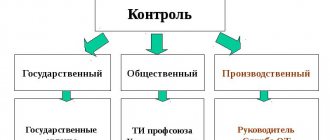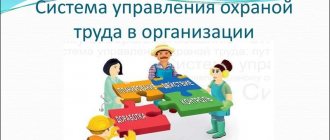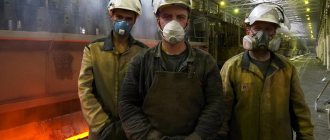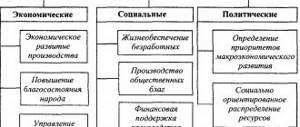Public administration: what does it involve?
Public administration involves appropriate activities on the part of bodies that are authorized to perform special functions of permission, control and supervision aimed at implementing national policy. Also, authorized authorities can implement legal provisions guaranteeing the safety of employees, prevent possible violations and eliminate detected shortcomings.
Labor safety instructions - a regulatory document for all enterprises of the Russian Federation
What is the essence of the system
Goals of implementation of state policy in the field of labor protection:
- creation of proper working conditions that do not pose a threat to health and life at enterprises of various forms;
- protection of the rights and interests of workers;
- prevention of unforeseen situations, accidents, industrial injuries.
Also, centralized regulation guarantees effective interaction and fruitful cooperation between objects of social and labor relations.
Government at the federal level
The Government of the Russian Federation is recognized as a kind of highest level of power in the labor field. And in particular, the Ministry of Labor. He has the following set of powers:
- develops basic management principles;
- prepares federal target programs;
- creates and implements safety rules at industrial facilities;
- controls the implementation of all-Russian programs at the level of individual regions.
All government agencies at the federal level are required to coordinate their actions in the labor sphere with the Ministry of Labor. It is this government body that makes final decisions and determines state policy in this area.
Who carries out
Occupational safety management at the enterprise and in the organization
Who carries out state management of labor protection in accordance with the Labor Code? Article 216 determines that all powers are exercised by the Government and authorized bodies on its behalf. At the same time, federal authorities must coordinate all actions with higher authorities.
Important! Some official powers on public administration issues can be transferred to local authorities (entities) on the conditions prescribed by law.
Public administration is carried out within the current official powers by government structures at the federal level and at the local level. A description of the functions of both divisions will be given below.
Federal government
State management of labor protection is carried out, as mentioned above, primarily at the federal level. These structures are responsible for:
- development of regulations that set out the fundamentals of the industry;
- development of targeted federal programs aimed at improving working conditions and health protection of employees at work;
- determining the order of training and instruction;
- establishing a scheme for conducting state examination of current working conditions;
- development of measures aimed at economic stimulation of activities to ensure safe working conditions;
- organizing interaction between federal and regional executive authorities with trade unions and employers' associations to implement development and control programs through joint efforts;
- coordinating specialized research activities, introducing advanced international experience;
- organizing systems of international cooperation on labor protection legislation.
Problems solved by state labor protection management: diagram
Federal government structures may also perform other functions in the field of state management of labor protection in accordance with the provisions of the Federal Law and other regulations of the Russian Federation.
Regional level of control
Executive subjects of local authorities of the Russian Federation are responsible for:
- implementation of state policy provisions and targeted programs aimed at improving labor safety conditions;
- development, approval of target programs at the territorial level, control;
- coordination of the training process for local workers, including employers and management of organizations;
- carrying out state examination of working conditions;
- collection, processing of information data on the state of conditions, quality of security in organizations under the jurisdiction of the subject.
Certain powers can be directed to local government.
State management of labor protection - by whom it is carried out
— Business organization — Personnel — State management of labor protection
One of the main methods of ensuring the constitutional right to safe work is state management of labor protection.
Every employee and employer should know who carries out state management of labor protection and what it is.
Failure to comply with legal requirements in this area may entail both a violation of the interests of employees and direct prosecution of the employer.
State management of labor protection - basic information
State management of labor protection is a collection of activities, legal regulations and relevant services that protect the rights of employees and monitor the implementation of legislative instructions. Thus, this issue is regulated primarily by the following provisions of Article 216 of the Labor Code of the Russian Federation, which is directly devoted to the issues of ensuring the legal basis for the aspect of labor activity under consideration.
The main tasks of state management of labor protection are:
- Taking government support measures to increase and optimize mechanisms that guarantee the safety of work activities.
- Drawing up, updating and adoption of documents and acts that would regulate the safety of work.
- Establishment of regulatory requirements for types of production and economic sectors, technical devices, means of labor and protection.
- Ensuring prevention and correction of existing violations that are detected at enterprises operating within the Russian Federation.
Goals of state management of labor protection
The main goals of state management of labor protection are as follows:
- Preserving the physical and mental health of working citizens of the Russian Federation and foreigners working in the Russian Federation.
- Checking compliance with labor protection regulations.
- Conducting procedures for assessing the existing environment in production.
- Carrying out and adopting standards for procedures for special assessment of working conditions.
- Prevention of emergency situations, as well as industrial accidents.
- Implementation of measures to support workers and members of their families who have suffered from negative labor factors.
- Accounting for accidents and other facts causing damage to the physical and mental health and well-being of workers.
- Financial support for various work safety measures.
- Conducting certification and training of employees of the state labor protection management system.
- Maintaining statistics on all main aspects of the activities of the state labor protection department.
- Systematization and provision of free access to information related to labor protection
- Introduction and control of tax and fee mechanisms designed to ensure labor safety.
- Ensuring strict standards for hygiene, worker health care and PPE.
- Assimilation and implementation of positive international experience in the framework of labor protection.
- Development and implementation of innovations in the field of labor protection.
Who carries out state management of labor protection
Since the field of activity under consideration is complex and quite broad, the question of who carries out state management of labor protection also does not have a clear and unique answer. Thus, this system requires its participants to provide the following basic functions:
- Permissive.
- Supervisor.
- Executive.
- Controlling.
- Legislative.
- Coordinating.
In addition, this system has several levels depending on the range of its practical application and the scope of legal relations on which it affects:
- Federal. At this level, the main body ensuring state management of labor protection is the Ministry of Labor. This body operates on the basis of Government Decree No. 636 of May 21, 2012.
- Regional. Regional authorities of the constituent entities of the Russian Federation have the right to independently determine individual standards in the field of labor protection, if they do not contradict federal requirements.
- Municipal. Municipal authorities are involved in the direct implementation and enforcement of state labor protection requirements.
- Corporate. At this level, certain labor protection measures are also implemented, implemented by local regulations of organizations or other internal documentation.
In general, in Russia the state administration of the system under consideration is carried out by the following government bodies:
- Prosecutor's Office of the Russian Federation. The prosecutor's office fully accepts workers' complaints about unfair actions of the employer towards them. In addition, in the field of public service work in law enforcement agencies and state security, employees may often have the right to apply exclusively to the prosecutor's office to protect their rights.
- Ministry of Labor. It is the main body that regulates the specific principles of the entire national policy in the field of relationships and labor safety standards.
- Rostrud. In this case, this structure is the main executive body, ensuring the practical implementation of the functions of supervision and control over the implementation of labor legislation.
- Labor Inspectorate. Direct compliance with the requirements of the state labor protection management system is ensured by regional and municipal offices of Rostrud in the form of separate labor inspectorates.
- Government. The legal framework necessary to ensure the operation of the entire state management system is partially established by the Government of the Russian Federation with the participation of the Ministry of Labor.
- State Duma of the Russian Federation. Legislative standards in the form of Federal laws affecting labor activity, as well as amendments to existing laws, are provided directly by the State Duma, as the main legislative body.
( 24 votes, 4.90 out of 5) Loading…
Source: https://delatdelo.com/organizaciya-biznesa/gosudarstvennoe-upravlenie-ohranoj-truda.html
When is expertise needed?
State examination of production conditions is carried out by an authorized subject of executive power or a federal body in the manner prescribed by law.
How are measures to improve working conditions and safety financed?
Expertise is needed for:
- certification of workplaces in accordance with established rules;
- providing employees with monetary compensation for performing hazardous work and activities in hazardous industries;
- assessing the degree of compliance of projects for reconstruction, construction, technical re-equipment of production facilities with current standards;
- analysis of working conditions, including in the period preceding the accident.
Grounds for state examination - appeals from authorities, employers, employees, trade unions, insurance funds, court rulings.
Important! The presence of legal grounds for an inspection is mandatory - an examination cannot be carried out just like that, in words.
Why should a country manage labor protection processes?
The desire to implement a labor protection system within the framework of state activities, or, in other words, the purpose of labor legislation is to ensure respect for the rights of working citizens to the opportunity to perform labor functions in safety, as well as to protect the interests of employers and personnel. It is implemented in the following tasks:
- ensuring the primary importance of saving the lives and preserving the health of working citizens;
- development, adoption and entry into force of regulations and targeted programs aimed at improving conditions and optimizing labor protection;
- checking compliance with adopted rules, laws and regulations on labor protection;
- expert assessment of the production environment;
- adopting work environment assessment procedures;
- promoting the prevention of emergencies and accidents at work;
- assistance to employees and members of their families whose health has suffered in the process of professional employment;
- clarification of circumstances and keeping records of facts of damage to health at work;
- financial support for labor protection measures;
- training and certification of labor safety inspectors;
- work with statistics on industrial accidents, occupational diseases and compensation paid for them;
- systematization of information related to optimization of the production environment and its protection;
- introduction of effective tax practices designed to ensure maximum efforts by employers to create and maintain a safe working environment;
- establishing standards regarding the provision of workers with protective and preventive means, medical care, appropriate sanitary and living conditions, etc.;
- mastering positive international experience in the labor protection field.
What objects are checked
OSHMS: occupational safety and health management system
State examination is carried out for any production facilities if it is necessary to assess real working conditions. It is also necessary for high-risk industrial production and other enterprises where people work.
Taking into account the purposes of the audit, the possible actions of authorized bodies and officials who represent them differ.
The responsible engineer conducts an examination of the facility
Types of violations
Types of liability for violations of labor protection requirements are established in Article 419 of the Labor Code of the Russian Federation. All types of liability are discussed below.
Consequences of violations of labor protection rules
There are several types of liability for violation of labor safety rules:
- Disciplinary – it is assigned to an employee who does not comply with current labor protection requirements. Types of liability - dismissal, reprimand, reprimand.
- Material liability - such liability is provided for by the terms of a specific contract; if there is no corresponding clause, the employee cannot be involved. Financial liability is assigned if the employee’s actions are illegal, there are pronounced actions or inactions that led to undesirable consequences.
- Administrative - also imposed for ignoring labor safety rules. Managers, individual entrepreneurs (if there are employees), and heads of enterprises are involved. The presence of intentional guilt is mandatory.
- Criminal - only individuals are involved, regardless of their position.
Important! The employee bears financial responsibility in the amount of monthly earnings. An exception is cases of payment to third parties who have suffered as a result of illegal actions, compensation from the employer.
Schematic representation of types of liability for violations
OSMS in Russia: state supervision and control
Due to the numerous requirements of labor legislation, monitoring their implementation is required. So, OSMS in Russia , according to Art. 353-354 of the Labor Code of the Russian Federation, implies monitoring the employer’s compliance with regulatory requirements for labor protection through:
- the Prosecutor General of the Russian Federation and subordinate prosecutors;
- The Federal Labor Inspectorate, consisting of a federal executive body authorized to conduct state supervision and control over compliance with labor legislation.
Laws
The procedure for regulating the work in the field of labor protection is determined by Article 216 of the Labor Code of the Russian Federation. If there are disagreements on the issues of conducting or assessing the results of the examination, authorized specialists turn to the requirements of the Federal Law “On the provision of state and municipal services.” All statements regarding disagreements are reviewed free of charge.
Federal authorities and regional structures are involved in resolving issues related to labor protection in Russian industrial production. When certifying workers, as part of the investigation of industrial accidents, an examination is needed. For violation of labor protection requirements, material, disciplinary, administrative, and criminal liability is provided.
Who carries out state management of labor protection
- Safety standards.
- Standard instructions and rules for occupational safety.
- Sanitary and epidemiological standards and norms that provide requirements for production factors.
- Draft acts on occupational safety They are being developed:
- Associations, enterprises, institutions, extra-budgetary state funds, associations.
- Federal executive institutions that implement functions related to the development of state policy and legal regulation in the intended field of activity. At the same time, representatives of industry associations of employers and trade unions participate in the development.
Draft acts that include occupational safety requirements are sent by institutions, enterprises, associations, extra-budgetary state funds, and associations to the federal executive body that implements the functions of state management of occupational safety and health.









